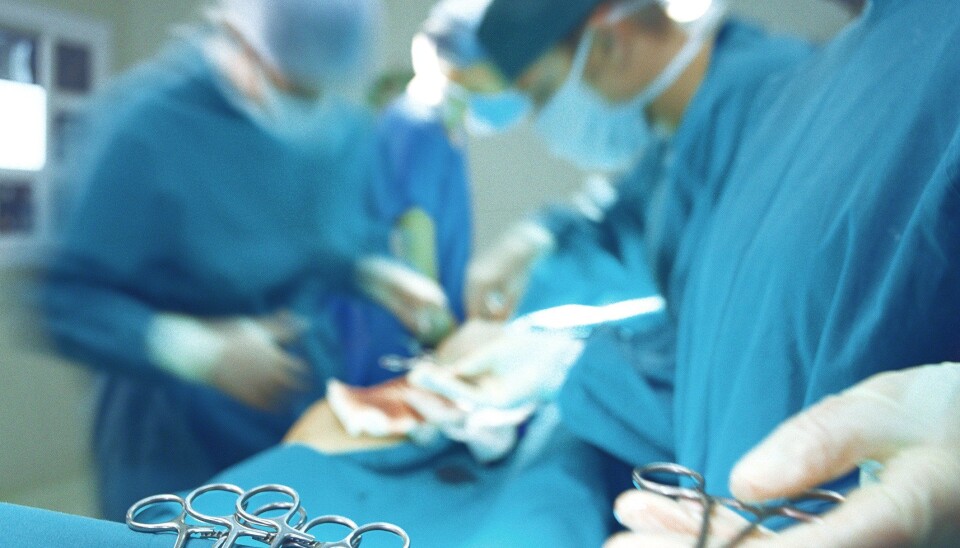
Surgery gives you jetlag
The inner clock of patients who undergo surgery is disrupted in the same way as when flying eastwards over several time zones. This jetlag stresses their already severely tried bodies enough to be life-threatening.
Surgery gives people jetlag – and the more serious the operation, the worse it gets, a new study shows.
"Our research shows that surgery resets the body's inner clock so that it no longer follows the rhythm of the day. As a consequence, people get jetlag in the same way as when they're flying four or five time zones eastwards," explains registrar Dr Ismail Gögenur of the Department of Gastroenterology at Herlev Hospital in Copenhagen.
He has written a dissertation about the study which has been published as an article in the Danish medical journal Ugeskrift for Læger.
Jetlag on top of surgery can be life-threatening
Healthy people with jetlag suffer a little discomfort in the shape of tiredness and diarrhoea, which are perfectly harmless. Sick or newly-operated people, on the other hand, are much harder hit by jetlag because it is an additional burden on their weak bodies.
Research into this field has not been industry driven, simply because no pharmaceutical company owns the melatonin patent. All melatonin research has been carried out at universities and hospitals.
"Jetlag constitutes an extra physical stress factor for patients," says Professor Jacob Rosenberg of Copenhagen University, a specialist at the Institute of Surgery and Internal Medicine at Herlev Hospital, who was also involved in the implementation of the study. "A person suffering a thrombus, for example, is under such pressure that having to cope with jetlag as well is extremely taxing. The overall burden may lead to atrial fibrillation and new blood clot, which could make the situation life-threatening."
Surgery interferes with the circadian rhythm
The body's circadian rhythm is controlled by melatonin, a sleep hormone. When it gets dark in the evening, the brain starts producing melatonin, which rapidly increases to the maximum level and then remains constant for the rest of the night. This causes a small reduction in body temperature. The person becomes drowsy and falls asleep, remaining in that state until the next morning when the melatonin levels fall drastically to a minimum.
In the new study, researchers measured how surgery impacts on the body's circadian rhythm, and the obvious way to do this is to measure the melatonin content of the blood or the urine in patients undergoing major or minor surgery.
The researchers took a blood or urine sample from various groups of patients every hour over the 24-hour period prior to the operation. The procedure was repeated for several days after the surgery.
The more complex the surgery, the worse the jetlag
The samples revealed that surgery caused the melatonin curve to flatten out in all patient groups.
After their operations, the patients found themselves in precisely the same physical condition as people who have interrupted their circadian rhythm after a journey – a condition which wreaks havoc with the melatonin curve, rendering the body unable to receive a clear signal about whether to wake up or fall asleep.
"The greater the extent of the surgery and the longer it takes, the harder the patient is hit," explains Gögenur. "Jetlag impacts on the person's feeling of well-being and their ability to think. The patients' melatonin curves did not return to normal until after several days, when fluctuations began to return."
Risk of death greatest at night
The researchers still lack adequate documentation of just how harmful this is for newly-operated patients; however, preliminary studies indicate that the interruption of the circadian rhythm by surgery constitutes a considerable risk to the patient. There is clear evidence of increased mortality among newly-operated patients.
Experience shows that the risk of dying from surgery is greatest at night, when melatonin levels are normally high, but are now low because of the operation, explains Rosenberg. There are indications that the cause of death may be an imbalance in the patient’s circadian rhythm.
"The researchers know that jetlag is due not to the anaesthetic but to the surgery itself. Earlier examinations of intensive care patients have shown that these patients got jetlag and that the jetlag was due to the operation," explains Gögenur.
Intensive-care patients are an especially vulnerable patient group, so further research was needed to determine whether other patient groups also experience jetlag - and this new study shows that this is actually the case.
Melatonin may be a wonder cure
Although jetlag is a serious threat to patients who have undergone surgery, the researchers believe it can be easily prevented.
Long-distance travellers can suppress their jetlag by taking melatonin tablets, which are available on prescription, and it may well be possible to prevent jetlag in newly-operated patients in the same way.
"We're hoping to normalise melatonin levels by giving patients melatonin after surgery," says Gögenur, referring to experiments that reveal how cancer patients sleep better when they take melatonin, which also has numerous other beneficial effects.
"Melatonin's potentially healing effect on jetlag and other imbalances or other illnesses is still in need of final verification, although the results so far look extremely promising," says Gögenur.
Read the article in Danish at videnskab.dk




